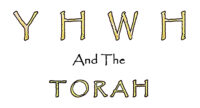1 And 𐤉𐤄𐤅𐤄 said to Mosheh, “Speak to the kohenim, the sons of Aharon, and say to them: ‘No one is to be defiled for the dead among his people,
2 except for his relatives who are nearest to him: for his mother, and for his father, and for his son, and for his daughter, and for his brother;
3 and for his maiden sister who is near to him, who has had no husband – for her he is defiled.
4 ‘A leader does not defile himself among his people, to profane himself;
5 they do not make any bald place on their heads, and they do not shave the corner of their beard, and they do not make a cutting in their flesh.
6 ‘They are qodesh to their Elohim and do not profane the Name of their Elohim, for they bring the offerings of 𐤉𐤄𐤅𐤄 made by fire, and the bread of their Elohim, and shall be qodesh.
7 ‘They do not take a woman who is a whore or a defiled woman, and they do not take a woman put away from her husband, for he is qodesh to His Elohim.
8 ‘And you shall qadosh him, for he brings the bread of your Elohim, he is qodesh to you. For I, 𐤉𐤄𐤅𐤄, who qadosh you, am qodesh.
9 ‘And when the daughter of any kohĕn profanes herself by whoring, she profanes her father. She is burned with fire.
10 ‘And the kohĕn ha’gadol among his brothers, on whose head the anointing oil was poured and who is ordained to wear the garments, does not unbind his head nor tear his garments,
11 nor come near any dead body, nor defile himself for his father or his mother,
12 nor go out of the Miqdash, nor profane the Miqdash of his Elohim, for the sign of dedication of the anointing oil of his Elohim is upon him. I am 𐤉𐤄𐤅𐤄.
13 ‘And let him take a wife in her maidenhood.
14 ‘A widow or one put away or a defiled woman or a whore – these he does not take. But a maiden of his own people he takes as a wife.
15 ‘And he does not profane his offspring among his people, for I am 𐤉𐤄𐤅𐤄, who qadosh him.’ ”
16 And 𐤉𐤄𐤅𐤄 spoke to Mosheh, saying,
17 “Speak to Aharon, saying, ‘No man of your offspring throughout their generations, who has any defect, is to draw near to bring the bread of his Elohim.
18 ‘For any man who has a defect is not to draw near: a man blind or one lame or disfigured or deformed,
19 a man who has a broken foot or broken hand,
20 or is a hunchback or a dwarf, or a man who has a defect in his eye, or eczema or scab, or is a eunuch.
21 ‘No man among the offspring of Aharon the kohĕn, who has a defect, is to come near to bring the offerings made by fire to 𐤉𐤄𐤅𐤄 – he has a defect, he does not come near to bring the bread of his Elohim.
22 ‘He eats the bread of his Elohim, both the most qodesh and the qodesh,
23 only, he does not go near the veil or approach the altar, because he has a defect, lest he profanes My Miqdashim. For I am 𐤉𐤄𐤅𐤄, who qadosh them.’ ”
24 Thus Mosheh spoke to Aharon and his sons, and to all the children of Yisra’ĕl.
